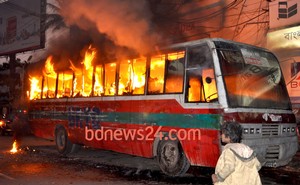Jamaat-e-Islami’s strike against recent verdicts against party top brass has hurt the country’s economy.
Shops, garments, and transports sectors have been badly hit.
Since Jamaat’s strikes are usually marked by violence, ordinary people and businessmen are gripped by fear on strike days.
Jamaat observed three days of strike on last Thursday, Sunday and this Monday after its chief Motiur Rahman Nizami had been sentenced to death for his crimes against humanity committed during the Liberation War.
Lifting the strike only for a day for ‘Ashura’, it declared a fresh round of strikes for Wednesday and Thursday in protest against the death verdicts of its leaders Mir Quasem Ali and Mohammad Kamarruzzaman.
The Federation of Bangladesh Chamber of Commerce and Industry (FBCCI) expressed deep concern over Jamaat’s shutdowns.
Small businesses mostly bore the brunt. Nearly 2.6 million shops faced a difficult time.
President of the Bangladesh Shop Owners’ Association SA Kader Kiron told bdnews24.com, “All shops together have a daily transaction of Tk 30 billion.
“On a strike day, our daily sale drops sharply. But we have to pay the daily operating costs. During strikes, we incur a daily loss of Tk 4 billion.”
Vice president of the Bangladesh Garment Manufacturer and Exporters Association (BGMEA) Md Shahidullah Azim said RMG exporters face shipment delays. A continuous strike also disrupts production and the overall supply chain.
Azim told bdnews24.com: “Time is a crucial factor in this business. Strike disrupts timely shipment of goods. If we fail to send the goods on schedule, we run the risk of losing our buyers. To retain the current buyers, we send our goods by air, bearing extra cost and incurring losses.”
The BGMEA vice president said in the wake of last year’s violent strikes, foreign buyer, BG world, cancelled orders with Bangladesh suppliers and placed orders worth several million dollars with suppliers in Vietnam.
Transport is another sector that badly suffers on a strike day. Nearly 1,000 vehicles were burnt and 3,500 were damaged during strikes last year.
According to a Bangladesh Bus and Truck Owners Association (BBTOA) estimate, owners face a daily loss of Tk 3 billion on strike days.
As the strikes in recent years have often turned violent, owners stop inter-city bus operations during shutdowns. Moreover, buses and trucks are not properly insured.
BBTOA Chairman Faruk Talukder Sohel said insurance companies are reluctant to insure vehicles as accidents occur all too frequently on Bangladesh’s streets and highways.
But owners have to insure their passengers while running new buses. However, lack of awareness and a cumbersome insurance claims settlement process dampens the urge to make claims.
In April this year, the World Bank in its Bangladesh Development Update said political strife in the last quarter of 2013 resulted in a value added loss of about $1.4 billion, hurting severely business and consumer confidence.
Source: bdnews24










